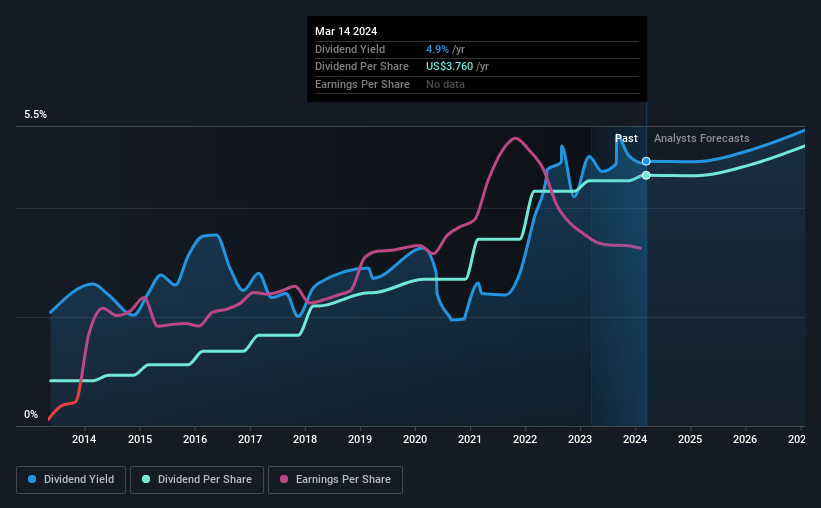Dividend Investors: Don't Be Too Quick To Buy Best Buy Co., Inc. (NYSE:BBY) For Its Upcoming Dividend
Some investors rely on dividends for growing their wealth, and if you're one of those dividend sleuths, you might be intrigued to know that Best Buy Co., Inc. (NYSE:BBY) is about to go ex-dividend in just four days. The ex-dividend date is one business day before a company's record date, which is the date on which the company determines which shareholders are entitled to receive a dividend. The ex-dividend date is important because any transaction on a stock needs to have been settled before the record date in order to be eligible for a dividend. Therefore, if you purchase Best Buy's shares on or after the 20th of March, you won't be eligible to receive the dividend, when it is paid on the 11th of April.
The company's next dividend payment will be US$0.94 per share, on the back of last year when the company paid a total of US$3.76 to shareholders. Looking at the last 12 months of distributions, Best Buy has a trailing yield of approximately 4.9% on its current stock price of US$77.46. If you buy this business for its dividend, you should have an idea of whether Best Buy's dividend is reliable and sustainable. We need to see whether the dividend is covered by earnings and if it's growing.
View our latest analysis for Best Buy
Dividends are typically paid out of company income, so if a company pays out more than it earned, its dividend is usually at a higher risk of being cut. Best Buy is paying out an acceptable 65% of its profit, a common payout level among most companies. Yet cash flows are even more important than profits for assessing a dividend, so we need to see if the company generated enough cash to pay its distribution. Over the past year it paid out 119% of its free cash flow as dividends, which is uncomfortably high. We're curious about why the company paid out more cash than it generated last year, since this can be one of the early signs that a dividend may be unsustainable.
While Best Buy's dividends were covered by the company's reported profits, cash is somewhat more important, so it's not great to see that the company didn't generate enough cash to pay its dividend. Were this to happen repeatedly, this would be a risk to Best Buy's ability to maintain its dividend.
Click here to see the company's payout ratio, plus analyst estimates of its future dividends.
Have Earnings And Dividends Been Growing?
Companies that aren't growing their earnings can still be valuable, but it is even more important to assess the sustainability of the dividend if it looks like the company will struggle to grow. If business enters a downturn and the dividend is cut, the company could see its value fall precipitously. It's not encouraging to see that Best Buy's earnings are effectively flat over the past five years. Better than seeing them fall off a cliff, for sure, but the best dividend stocks grow their earnings meaningfully over the long run. Earnings have been growing somewhat, but we're concerned dividend payments consumed most of the company's cash flow over the past year.
Another key way to measure a company's dividend prospects is by measuring its historical rate of dividend growth. Best Buy has delivered an average of 19% per year annual increase in its dividend, based on the past 10 years of dividend payments.
To Sum It Up
From a dividend perspective, should investors buy or avoid Best Buy? Best Buy is paying out a reasonable percentage of its income yet an uncomfortably high 119% of its cash flow as dividends. What's more, earnings have barely grown. With the way things are shaping up from a dividend perspective, we'd be inclined to steer clear of Best Buy.
With that being said, if you're still considering Best Buy as an investment, you'll find it beneficial to know what risks this stock is facing. For instance, we've identified 3 warning signs for Best Buy (1 is concerning) you should be aware of.
If you're in the market for strong dividend payers, we recommend checking our selection of top dividend stocks.
Have feedback on this article? Concerned about the content? Get in touch with us directly. Alternatively, email editorial-team (at) simplywallst.com.
This article by Simply Wall St is general in nature. We provide commentary based on historical data and analyst forecasts only using an unbiased methodology and our articles are not intended to be financial advice. It does not constitute a recommendation to buy or sell any stock, and does not take account of your objectives, or your financial situation. We aim to bring you long-term focused analysis driven by fundamental data. Note that our analysis may not factor in the latest price-sensitive company announcements or qualitative material. Simply Wall St has no position in any stocks mentioned.

